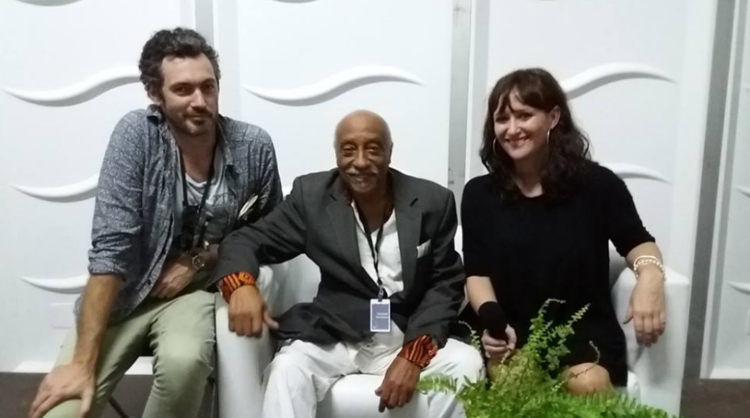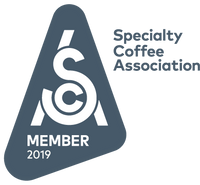
In Conversation | Mulatu Astatke
HHCO: We have the great pleasure to be here in the UAE, sitting with Mulatu Astatke before a performance in Abu Dhabi. We heard you’ve been here before?
MA: For three months I was working at the Sheraton my band was playing here and this afternoon I went back to see the place. I was really confused as there have been big changes – it has completely changed. I was there 17 or 18 years ago.
MA: What happened was that there were these Filipino groups playing at the Sheraton at the time, so I watched them play a lot. But with regards to local groups - I didn’t get much time to work with them but I love Arabian music – I love their rhythms, I like their scales and I also like the arrangements – it’s really beautiful music. But I never really had the time to work with them.
HHCo: There are a lot of people who have sampled your music – can you tell us a bit more about those collaborations, what’s the most surprising outcome?
MA: Oh yes, a lot of people have sampled my music – like Nas, Damien Marley, a lot of Americans. Many people – some of them I’ve never heard of them!
I remember I had a press conference in Paris – I was at a radio station and somebody played a song that had sampled my music – I had never heard of it at all, I was so surprised, the guy asked – have you heard this? I said no! I’ve never heard of this. A lot of people are sampling my music.
Nas, Marley did a nice job – I like what they’ve done. And Talib Kweli, friends with Naz. We managed to play together in Brazil. I was there two times in Brazil.
HHCo: Have you spent a lot of time in that part of the world? Cuba for example. Has it influenced your music, or the other way around?
MA: Yes, I was in Havana and that’s what everybody thinks, that my music or I was influenced. But they’ve been influenced by African music so I don’t sound like them when I’m an African – they sound like us – that’s what I really mean.
HHCo: Could you talk us a through a bit about Ethiopian rooted sounds and the influences these may have had further afield?
MA: Africa has contributed so much for modern music developments around the world and I do a lot of research. I was at Harvard near Boston, I have a fellowship from Harvard University and I’ve done a lot of lecturing there. One which is so interesting was about the scientific side of the church music in Ethiopia and its contribution. So there is one stick like this and two parts on top and we use it to conduct music. It’s very much about the movement of the stick and how they conduct. We call it makwavia. You may have seen it in military marching bands, holding this and 90% of that movement is found on this stick, from the 6th century. That is what I’ve been defending at Harvard – that conducting is Ethiopia’s contribution to the world and it is so interesting since you asked about the cultures and contribution of Africa, in particular the tribes of Ethiopia. Conducting could be seen as the contribution to the classic music of the world but if you think about jazz, there is a tribe in the south of Ethiopia called the Derashes. They play a diminishing scale. I was also at Berkeley College, the first half of my Phd is from Berkeley. So, that place is a diminishing scale school, like Charlie Parker. So Charlie used two types of diminishing scales and Debussy also. So the thing was that these tribes, they played one type [of diminishing scale] centuries ago.
“I played this film to them and said ‘so when you are teaching here, you are telling us how Charlie Parker created modern jazz through this diminishing scale, so I said is this Charlie, Debussy or this tribe?’”
My question was, I did a beautiful fusion of jazz and the tribes together – and I made a film and I took it to Berkeley when I was at Harvard. I played this film to them and said ‘so when you are teaching here, you are telling us how Charlie Parker created modern jazz through this diminishing scale, so I said is this Charlie, Debussy or this tribe?’ They couldn’t answer this, all they can say is – we can’t know. So through the science of jazz the African contribution is big, it’s not only rhythms – they talk about African rhythm – but it is also a contribution to the science of music. And also the dancers – the dancers you see now, Michael Jackson even – I can show you all the steps from Ethiopia, Michael Jackson’s steps and Beyoncé’s step.
HHCo: What you are talking about here is the same thing as the Saint Yared? [the legendary Ethiopian musician credited with inventing the sacred music tradition of the Ethiopian Orthodox Church and Ethiopia's system of musical notation].
MA: Yes, that’s right. I am writing a beautiful opera in London involving about 70 people, which will be at the Barbican. So the opera is all about this – there is a part where the choir are using the conducting stick. But I took that part out and I wrote the whole symphony from behind it. So, now I have two conductors – the choir is conducted by an Ethiopian priest and the symphony is conducted by an European conductor – it’s going to be a beautiful work, I can tell you. So that’s Saint Yared’s contribution – to show the 6th century and the modern – I’m going to work with the BBC second symphony orchestra. I hope it will be a beautiful work.
HHCo: When you’re playing gigs all over the world, you work with local musicians or do you tour with a band mostly – how does that affect the performance?
MA: I have a band from England and for most of the concerts I bring them with me. But when I’m at home I use local musicians. For example, 2 weeks ago we had a beautiful programme where the band came over to Ethiopia. And I have a beautiful jazz club, the African Jazz Village and my band came over and working on a fantastic programme.
The band I work with – we have been working together for 4 and half years (2016). We travel together and play together. I do use different musicians – mostly two trumpet players, two sax players, two drummers so when one can’t make it the other can take over.
This is the regular band though – who started with me 4 years ago or so, we work together on the special concerts. For this performance (Dubai) the bass player is a different guy, the trumpet is a different guy, the drummer is a different guy but the piano and percussion are the same – they are all great musicians.
HHCo: Is it a multi-generational band, is that important?
MA: Yes, I have all ages in the band – as long as they sing my message – as long as they play everything correctly, the way I want it to play, the way I want it to sound – as in the Ethio-jazz sounds, it’s fine with me – their age is irrelevant.
HHCo: Can you tell us which Ethiopian musicians we should be looking out for – would be great to hear more about what you are playing in your club and who to look out for in Ethiopia at the moment?
MA: Well I have about 4 different bands playing. On Wednesday it’s strictly jazz, Ethiojazz with a great guitar player. On Thursday we have old famous Ethiopian singers. On Fridays we have a group from the south of Ethiopia – very interesting. On Saturdays, in fact opening tonight we have a very famous Ethiopian singer and the guitar player it’s a full house tonight - tonight will be fantastic – a full club.
Jazz in Addis is catching up. You know jazz doesn’t influence a lot of Africans in Africa. It’s probably because the education systems we have. If you go to Europe or American, music is taught at Kindergarten and 12th grade - it’s a compulsory subject. Mostly in third world countries it’s not like that, there’s some kids that have not had any experience of music at all. Physics, chemistry all that kind of thing is encouraged – you don’t know how many great talents we lose because they tend to become an engineer or a doctor. The creative talent inside is different to what they do day-to-day. They are not given the chance to find out about themselves.
“As long as they play everything correctly, the way I want it to play, the way I want it to sound – as in the Ethio-jazz sounds, it’s fine with me – their age is irrelevant.”
HHCo: Was this the same when you were younger – did you face these same challenges?
MA: Yes, I went to North Wales – a very precise school. That’s where I found out about myself – I went there to study aeronautical engineering because I was good at physics and maths. But once I got there - they gave us everything – it’s about how they create a person. I remember every Saturday they would always find out what we had done from Monday to Friday, each of us so they could asses you and study you and guide you towards the right directions. And luckily, they were always telling me that if I continued with music they thought I would be great – so that’s how I became a musician. In Ethiopia, I put myself as an example I could have become an average engineer but it’s what’s inside. I wish the education system should be changed you know, so we get some talented people.
“You don’t know how many great talents we lose because they tend to become an engineer or a doctor. The creative talent inside is different to what they do day-to-day. They are not given the chance to find out about themselves.”
HHCo: What do you have in the pipeline and what are you currently working on?
MA: One is the opera that I mentioned. But then also, I’ve been upgrading traditional musical instruments. Ethiopian music is usually based on five notes and four different notes so maybe you’ve heard of the krar instrument before with 5 or 6 strings – I’ve modified some and brought these up to 8 strings. We’ve managed to play a few jazz numbers – because of the scales it works and we played this through at the club for the first time. So the instrument may have been in use for centuries and centuries – the guy who plays this instrument we call them the asmaris. So I have this programme called ‘changing the life if the asmaris’ to the 20th century. The next thing would be to after upgrading these traditional instruments, is to upgrade our music traditions. We are not only upgrading, we are also changing the minds and the thinking of the musicians – all they have known are these five notes. So when upgrading they have to study the scales, study the harmonies, you are just changing the life also, everything – this is also a project I am very interested in.
I’ve also been writing for different films, maybe you’ve heard about the film The Broken Flowers – with Bill Murray and Sharon Stone. Also, I was in Dublin a month or two months ago, and worked on a fantastic film called Dare to be Wild. Also on a film called The Runners about the Ethiopian runners – asking if it is a talent or does it come from practice? It’s with a great British producer. Also we have been talking about making a film called the ‘Making of Ethiojazz’. I am discussing this with three or four producers from England, Bulgaria and America – we are talking about how to do it. There’s a book written about the making of Ethiojazz from a South African University, UNISA. A beautiful book about me, about my life history and I was there for the book signing ceremony – and we want to convert that into a film.




